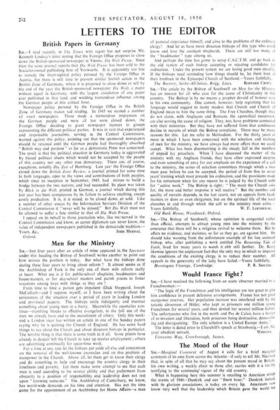The Rectory, Saxby-All-Saints. Brigg, Lincs. BERNARD CROFT. SIR,—The article by
the Bishop of Southwell on Men for the Ministry has an interest for all who care for the cause of Christianity in this country. The Bishop. is by no means a prophet devoid of honour save in his own community. One cannot, however, help regretting that his language would suggest to many readers that Church and Church of England mean to him the same thing. The Free Churches, though they do not claim, with Anglicans and Romans, the apostolical succession, are also serving the cause of religion. They, too, have problems connected with their ministries. But they have not suffered from that continuous decline in recruits of which the Bishop complains. There may be many reasons for this. Let me refer to Methodism. For the thirty years or more in which I have been concerned with the selection and trainine of men for the ministry, we have always had more offers than we could accept. What has been disconcerting is the steady fall in the numbers of unpaid lay preachers. When have discussed the matter of the ministry with my Anglican friends, they have often expressed surprise and even something of envy for our emphasis on the experience of a call to the ministry, the series of selection committees through which a man must pass before he can be accepted, the period of from five to seven years' training which must precede his ordination. and the provisions made for his retirement when for any reason he is judged by the Church unfit for " active work." The Bishop is right: " The more the Church asks for, the more and better response it will receive." But the number and quality of recruits depends, in the last resort, not on appeals from head- masters or dons or even clergymen, but on the spiritual life of the local churches in and through which the call to the ministry must come.—
Yours faithfully, W. F. LOFTHOUSE. Old Bank House, Woodstock,.0xford.


































 Previous page
Previous page